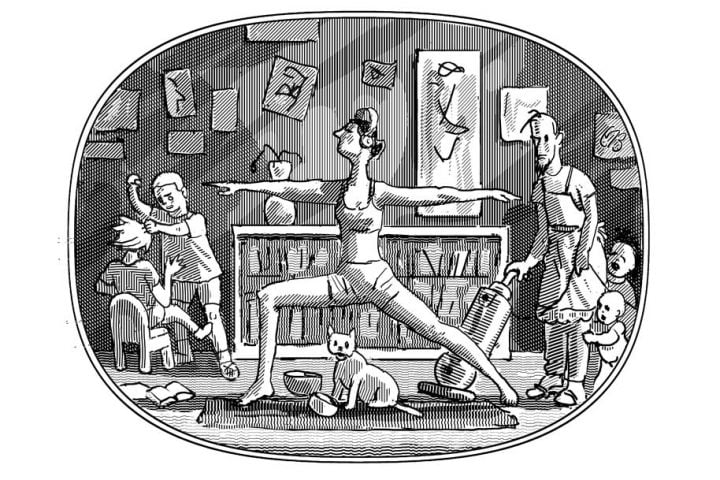Books Reviewed
Entitled: How Male Privilege Hurts Women is Kate Manne’s follow-up to Down Girl: The Logic of Misogyny, which won the American Philosophical Association Book Prize in 2019. Down Girl held that misogyny is a systemic issue, not just a vice some people have. It also coined the term and asserted the harmfulness of “himpathy,” a dubious kind of sympathy that people often have toward male perpetrators.
These ideas are central to Entitled’s thesis that “an illegitimate sense of male entitlement gives rise to a wide range of misogynistic behavior.”
When a woman fails to give a man what he’s supposedly owed, she will often face punishment and reprisal—whether from him, his himpathetic supporters, or the misogynistic social structures in which she is embedded.
Sundry evils are supposedly traceable to male entitlement. These range from husbands’ failure to do their fair share of household chores, to doctors’ inordinate skepticism of female patients who say they’re in pain, to the prevalence of “mansplaining,” to Harvey Weinstein. Violence perpetrated by “incels”—involuntary celibate men who are radicalized online—is clearly motivated by some combination of misogyny and general resentment. Manne would have us believe that this fringe internet subculture is an especially toxic manifestation of the pervasive misogyny that explains many other evils.
The best that can be said for Entitled is that Manne, a Cornell University philosophy professor, occasionally draws attention to important issues. For instance, she discusses a study showing that American police departments dispose of a large proportion of prosecutable rape cases through a procedure known as “exceptional clearance,” which is rarely applied to murder cases. A related problem is that many rape kits are disposed of without being tested or go untested for too long.
More often, though, Manne makes the facts fit her narrative instead of the other way around. Misogyny, she contends, explains why physicians give painkillers to women more sparely. In an awkward endnote, she writes: “Of course, receiving opiates for pain relief is, in some cases, a mixed blessing given the opioid crisis in this country.” That appears to be an oblique acknowledgment that men die disproportionately from opioid overdoses. She adds that “the point here is just that the prescription of opioids to boys and men…indicates that male pain is being taken more seriously than female pain.” But from another angle, it looks like the medical establishment harmfully infantilizes men, betraying, if anything, systemic misandry rather than misogyny.
***
Manne struggles to demonstrate the importance of “himpathy,” defined as “the disproportionate or inappropriate sympathy extended to a male perpetrator over his similarly or less privileged female targets or victims, in cases of sexual assault, harassment, and other misogynistic behavior.” Manne’s exhibit A is the controversy that preceded Brett Kavanaugh’s appointment to the U.S. Supreme Court in 2018. Readers will probably recall that during the confirmation hearings, Christine Blasey Ford accused Kavanaugh of sexually assaulting her in 1982, and that Kavanaugh vehemently denied this.
Manne attributes “himpathy” to many of Kavanaugh’s supporters, including Republican Senator Lindsey Graham, who said that Kavanaugh and his family had been “put through hell” during the proceedings. Manne writes: “Himpathy made Kavanaugh seem to Graham to be the real victim in all of this.” But in the dialogue Manne quotes, Graham says that both Kavanaugh and Ford were victims of the Democrats’ conniving, not that Kavanaugh alone was a victim. In any event, do we need the concept of “himpathy” to explain Graham’s reaction? Couldn’t generic partisanship (or his simply believing Kavanaugh) fully explain his behavior?
The way that Manne defines “himpathy” makes the sex of the putative victim important. But suppose a man had accused Kavanaugh of some form of aggravated assault comparable in gravity to that of which Ford accused him. Let’s stipulate that the evidence of this assault was as strong (or weak) as it was in the case of Ford’s accusation. Would the outcome be very different? I think not; Republicans, probably including Graham, would have supported Kavanaugh and Democrats would have opposed him. The fact that Kavanaugh’s actual accuser was female doesn’t seem to have mattered very much, which means that himpathy didn’t play an important role.
***
Entitled’s discussion of the Kavanaugh controversy signals that Manne is writing for, and only for, readers who already agree with her. Her analysis of the pro-life movement makes it especially clear that she has no interest in even pretending to present opinions that she does not share in a way that people who hold those opinions would accept. Manne claims that wanting to criminalize abortion, or even significantly regulate it, manifests “a deeply draconian, deeply troubling attitude.”
Remember, the state doesn’t regulate certain behaviors that most people think are immoral—lying to and cheating on one’s partner, say—or behaviors that some people think are tantamount to murder—eating meat, for example.
Of course, many who think that “meat is murder” do want state action against the animal agriculture industry, just as pro-lifers want prohibition or limitation of abortion. Manne paints the pro-life movement with a misogynistic brush without considering the arguments against abortion, or even acknowledging that such arguments exist. She instead attacks motives, expressing doubts about whether “pro-lifers” are very concerned about life. After all, they often don’t share her righteous views on the death penalty and other issues. Suffice it to say that this line of criticism would, at most, show that pro-lifers don’t always apply their values consistently, not that the values themselves are wrong.
Although Entitled occasionally points to issues worthy of further investigation, its flaws are as systemic as the misogyny it decries. The book is confirmation-bias candy for those who share Manne’s dogmatic feminism, but will be unpersuasive, and maybe even risible, for all other readers.





